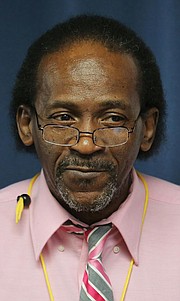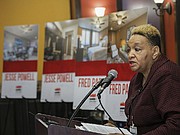The Little Rock housing authority board unanimously decided in April to put then-interim director Marshall Nash on unpaid administrative leave, a federal report says.
But the vote did not take place in public.
A U.S. Department of Housing and Urban Development office of inspector general report, sparked by a former employee's whistleblower complaint, states that the Metropolitan Housing Alliance's board of commissioners voted unanimously April 9 to put Nash, who was serving as the "special adviser" to the board, on administrative leave.
An Arkansas Democrat-Gazette reporter waited in the lobby of the housing authority offices for about seven hours that day while the board reportedly met with a job candidate in private.
After that private session, commissioners met in public for close to 40 seconds, during which Chairwoman Leta Anthony announced a recommendation to continue the interview process for the next two candidates. No mention was made in public of a vote to put Nash on administrative leave.
The vote on Nash came to light when the newspaper obtained the federal report last week, documenting the latest in a history of incidents in which the housing agency's board has skirted the Arkansas Freedom of Information Act.
"There's no such thing as a private vote," said Robert Steinbuch, a professor at the W.H. Bowen School of Law at the University of Arkansas at Little Rock and co-author of the Arkansas Freedom of Information Act textbook.
That law requires governing bodies to vote in public, although discussions on certain matters, such as some personnel actions, can take place in private. But votes on any privately made decisions must be done in public.
The act also requires governing bodies to make public most documents -- such as communications among members, spending records and meeting minutes -- with a handful of exemptions.
These requirements allow the public to monitor decisions made by public bodies that spend taxpayer money.
The Arkansas Freedom of Information Act (ACA 25-19-102 through 110) notes that "it is vital in a democracy that public business be performed in an open and public manner" to allow citizens to be made aware of "the performance of public officials and of the decisions that are reached in public activity and in making public policy."
The Little Rock housing agency is the largest provider of public housing in the state and had a budget of over $25 million for 2019. Its members are appointed by the Little Rock Board of Directors
Negligently violating the act is a Class C misdemeanor under Arkansas law. Steinbuch said interested parties, including any employee placed on leave, can alert members of the governing body that they have violated the law, give them a chance to remedy it and file suit to nullify decisions made in private.
HUD investigated the local agency after a former deputy director claimed that she was fired in retaliation for reporting to Anthony concerns about Nash's absences from work, among other issues. The report found her claim credible, and she is the plaintiff in a federal wrongful termination lawsuit filed Thursday that names the housing authority as the defendant.
Three housing commissioners -- Monique Sanders, Lee Lindsey and Anthony -- did not return calls requesting comment Friday on the Nash vote or inspector general's report.
Commissioner Louis Jackson declined to comment on the contents of the federal report, detailed in a Friday Democrat-Gazette article, saying he hadn't had time to read the article.
When asked about the private vote in April, he said, "I can't remember ma'am."
Reached by phone, commissioner Kenyon Lowe at first said he couldn't comment on the pending litigation, but then went on to question why a reporter was asking about an employee who had already been terminated.
"That's a closed matter," Lowe said. "Why would you think that would be an open matter?"
He added that the allegation that former deputy director Dana Arnette's firing had been retaliatory was "conjecture." He said he and Jackson had met with her, not just Anthony, to discuss several topics. Arnette never mentioned Nash's attendance to him, he said.
"She can file anything she wants to file," he said of the lawsuit. "It's her right to do so.
"There were no issues that were brought to the board with Mr. Nash," Lowe said.
But Anthony told a federal investigator that Arnette, who was also the authority's chief operating officer, had drawn issues about Nash to her attention. Anthony added that she didn't take the matter to the board, according to the report.
Lowe said Friday that Arnette was terminated in December for not going to work.
Anthony had previously told the board in an email that Arnette was fired for "performance and misconduct."
The federal report says there is no evidence of any previous disciplinary action in Arnette's file.
"Arkansas is an at-will state," Lowe said Friday. "I don't need to give you a reason as to why I terminate you. You should know that."
As to the April meeting, Lowe said it should never have been public.
The usual public notice was not sent out for that meeting, the newspaper previously reported. Instead, Anthony emailed the newspaper's email address, rather than the reporter who covers the authority, and four other news outlets on April 2. Usually, an authority staff member sends out meeting notices to more than 30 email accounts.
On April 9, board members met upstairs at the housing authority, and a reporter was told she could not wait outside the room. Later that day, commissioners moved to a first-floor conference room, and Anthony announced: "We are coming out of executive session."
Lowe said Friday that meetings called by staff members aren't public, apparently a reference to a 1994 attorney general's opinion concerning an arbitration hearing involving a school board in a contract dispute.
He then referred to an Arkansas Supreme Court decision from El Dorado that decided that three members of a governing body must be present to constitute a meeting. An attorney general opinion on the same case said that such decisions must be made on a case-by-case basis and that two members may constitute a public meeting.
"It wasn't a board meeting," Lowe said of the lengthy April session. "Not all meetings are meetings. ... If we did anything wrong, go over there to [Larry] Jegley and file your affidavit, and we'll go to court."
Jegley is the Pulaski County prosecutor, who in 2014 filed a criminal case against then-director Rodney Forte for violating the Freedom of Information Act.
The action came after Forte attempted to charge the newspaper more than $16,000 to hire outside workers so the authority could comply with an open-records request. Forte was found guilty by a judge, but he demanded a jury trial on appeal, at which he was acquitted.
Nash replaced Forte, whom the board pushed to resign early in November. Forte had asked to stay through the end of the year.
In a later meeting, during the public comments portion, Anthony silenced a meeting attendee who stood up to speak after she mentioned Forte, saying the board could not discuss personnel matters.
The board often cites personnel matters to go into executive sessions -- twice in hourslong private Saturday meetings with no decisions announced.
Arkansas law says that personnel matters that can be discussed in so-called executive sessions include: employment, appointment, promotion, demotion, disciplining or resignation of a public officer or employee. But any decisions must be made in public.
The April meeting was held to conduct the first set of interviews with a potential candidate for the executive director position. The second such meeting on April 12 was also conducted mostly in private, and the board accepted Nash's resignation letter that day.
In March, commissioners chose three finalists for the director's post during an executive session on the agency's fourth floor. They did not vote in public on that decision.
After the April meetings, Mayor Frank Scott Jr. tweeted that he had met with the board chairman and told the city attorney to conduct Freedom of Information Act training for the board and staff.
"All involved in the field of public service should be accountable to the public, clear with its communications and transparent in its operations," he tweeted in part. "This is our city's standard, and we will work with our partners to ensure the same is provided."
That training hadn't occurred as of Friday, said Stephanie Jackson, the mayor's communications director.
The city attorney "knows that it is something that the mayor directed him to do, so it will happen; it just hasn't happened yet," she said.
Scott wasn't available for an interview Friday, but Jackson said he wouldn't comment on pending litigation or related issues, such as the HUD report.
Anthony's term with the commission has expired, and although commissioners voted to recommend another term for her, the city Board of Directors must ratify that vote. The vote was delayed and is set for the next board meeting.
Only two city directors -- Ken Richardson of Ward 2 and at-large director Gene Fortson -- returned the newspaper's calls for comment.
Fortson declined to comment on the federal lawsuit and said he needed more information regarding agency transparency.
"That's a critical decision the board is going to be facing, and I can't just go solely on the facts in a newspaper story," he said Friday.
Richardson, who is a board liaison to the housing authority, said he had scheduling conflicts and hadn't been able to attend recent meetings.
"I think normally in most cases, when someone is terminated, especially at that level, you would have written documentation of disciplinary actions," he said of the HUD report's description of Arnette's personnel file. "I'm somewhat curious and disturbed."
He added that transparency is a concern with any governing body that spends taxpayer dollars.
"You can't have processes that are not transparent," Richardson said. "I think it creates a lot of doubt, a lot of suspicion about how you're functioning."
But, he said, it's premature to say whether transparency concerns, the federal lawsuit or the HUD report will weigh on his decision in appointing Anthony to another five-year term.
"I would give Leta the benefit of the doubt," he said.
SundayMonday on 10/20/2019





